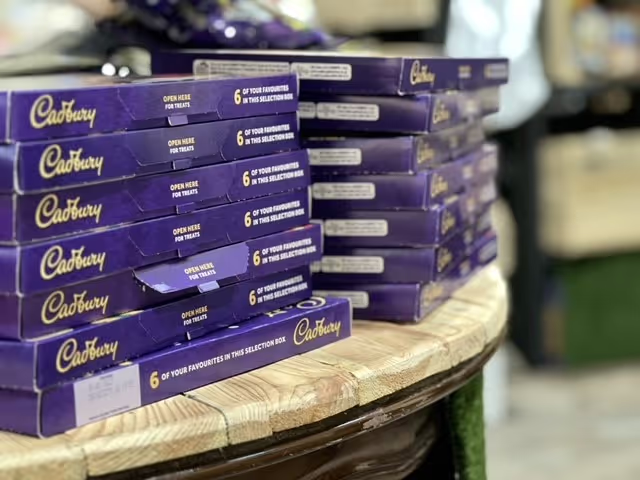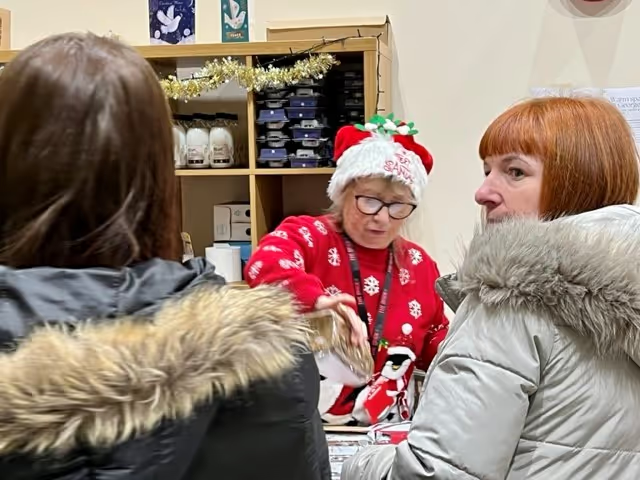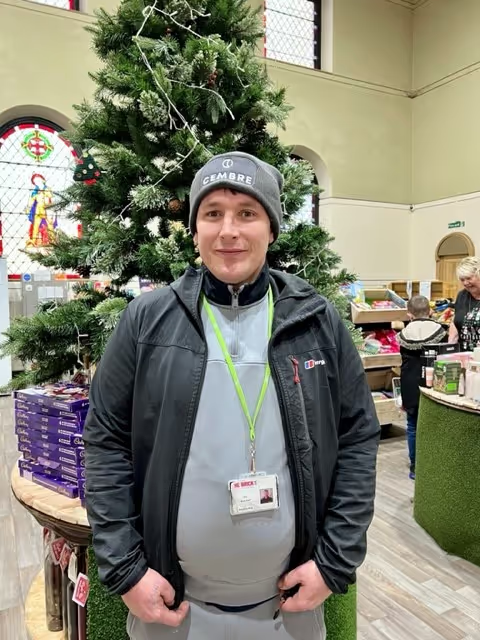
The two Wednesday’s before Christmas has seen The Brick Food Community in St George’s Church Hall Wigan, transformed from a vitally important community anchor (its everyday function) – into something utterly magical, life-affirming…and for me…humbling.
If all you know of Wigan is a Pier, Orwell’s 1930s account of Northern poverty, energetic all-night dancing and George Formby greeting shoppers as they enter the town’s Grand Arcade: there is much more.
And so, with only four more sleeps until Father Christmas performs his global flypast, I head to the Greater Manchester town, that like many of its northern neighbours was once at the beating heart of 19th century British dominance, thanks predominantly to its multitude of mill and coal mining operations.
In 2008 – and just as in communities such as Wallsend and Wistow, the people of Wigan found themselves again on the leading edge – but this time, in the aftermath of the wholesale deindustrialisation of the North. It wasn’t the relentless clank of heavy industry that was keeping them awake at night, but the very real threat of poverty – and the demise of their communities.

Queens Hall Action on Poverty were already acutely aware of the looming crisis for the local population of almost 312,000, (326,000 in 2018) when the wheels fell off a global system only concerned with profit – and not people. Lancastrians suddenly found themselves brushing shoulders with the ‘Lehman Brothers’ in the queue for a Galloways pie.
One of the first interventions from the organisation responsible for the Christmas initiative I’ve come to see, came that same year: in a room at the Bricklayer’s Arms on Hallgate. And they have been providing not only a safety net – but more importantly – a building block in the borough ever since.
The Brick (the name given to the organisation by locals, because of its early days operating from the former pub) describes itself as: “…a growing project that delivers big results for the community it serves. It offers services to people who are homeless, in poverty or facing debt crisis.
As its name suggests, it provides a safe, solid building block for people in crisis to begin to construct a new life and become valuable members of society.”
I’m not clever enough to know if we’re in transitive verb/understatement territory with their modest mission statement: but you know oxygen – and sunlight – and being loved? The people who are The Brick –are as important.

In what might be her busiest week of the year, I’ve been invited along by Caroline Grainger, who is The Brick’s Pioneer Chaplain, their Interim Food Community Lead – and also responsible for the ongoing Warm Spaces provision. I’d anticipated a high-achiever…and when I meet her for the first time – holding a turkey crown in each hand, while moving a box with her foot – it’s confirmed.
While Caroline’s busy making one family’s festive season a whole lot better, I wander around the 250-year-old red brick St George’s Centre on Water Street, that in its latest incarnation is the headquarters of The Brick’s Food Community. It’s not a Food Bank – we’ll get to that later.
Laid out as you might expect any grocery store to be: as it’s Wednesday, everywhere has had the Christmas treatment – and from the Christmas tree that has masses of selection boxes beneath, you can head off down the aisles to select the items for your own perfect feast, before browsing a wall full of presents, cleverly divided into different age groups. Today shoppers are leaving this former church with not only delicious food, but also with special gifts for their nearest and dearest.
I’m re-positioning an Elf on a Shelf for his magazine debut when Susan joins me (possibly because I look like I don’t know what I’m doing). After my embarrassed explanation and introduction – this dyed-in-the-wool Wiganer grabs my arm and asks “Have you had a brew? Do you want one?” They’re rhetorical questions – and I’m enveloped in a sense of warmth and welcome as Susan, one of the key volunteers on duty today, organises my brew.
As I listen, Susan (who looks magnificent in Christmas jumper and Santa hat) tells me that the team at The Brick are like a family. “I worked in Children’s Care, but took early retirement to look after my dad just as Covid hit. He was in a Home but he died during the first lockdown.”

Clearly with a lifetime of looking after others under her belt, Susan wasn’t going to slow down and put her feet up – so she became a volunteer – and now carries out a number of different roles for this inspirational third sector organisation.
It’s already clear that in Wigan the community is working together to look after each other and tackle the challenges that any of us might face at any moment. As a Manager from a local construction company who’s also volunteering for the day, unloads the latest van to arrive with further stock – much of it collected, purchased and donated by local businesses, individuals and groups – I’m struck by the way these people are invested in their town and their future.
Susan introduces me to Kevin, who she describes as a Brick success story. Kevin is 40 and eager to talk about his journey: After years of addiction, homelessness – and a 5-year custodial sentence for drug offences, he left prison 2 years ago, facing the same massive challenges that he’d known previously.

Released with no support to access housing, a return to rough sleeping seemed unavoidable. But something clicked – and Kevin and The Brick formed a partnership that has seen him secure his own accommodation, beat his addiction, secure a GROW Traineeship role with Wigan Council – and work with the Changing Futures project (which is an inspirational initiative focussed on supporting people facing multiple and complex barriers to employment). Changing Futures is funded through the National Lottery and the European Social Fund.
Kevin explains: “I can’t read or write – so everything I say comes from my heart. I go to Chester University to talk to students about my life experiences – and I just say it.”
He regularly speaks with health and social care students – invited by the university to inform them of the challenges facing people in similar situations to his. “I made a ‘Zine’ about what I do. I’ll send you one. And I was interviewed by Kay Burley for Sky News in May.” The matter-of-fact recounting of his progress and achievements to date leaves me wide-eyed (and not for the only time today – trying to suppress an inferiority complex).
After Kevin, I’m compelled to say hello to another member of the team who’s busy restocking Christmas treats: Katie is 24 – and is wearing what looks like a cooked turkey on her head. She too has had a difficult journey – but she is unbeaten. Losing both parents within 18 months recently, she had a period of homelessness after arranging their funerals. She has additional learning needs, but is a key member of the Food Community team. Like Kevin she has an ‘aside’ that most of us couldn’t compete with: ”Did I tell you I won the Inspirational Young Adult award at the ‘Best of Wigan’ Awards last month?”

John is 48 and another volunteer. Before we speak, I’d already read the front of the hoodie he’s wearing that states: “Ask me about Naloxone” – so I do.
“I was an addict for 27 years, but I’m 2 years clean now. I’ve been trained to give Naloxone to anyone who’s overdosed” - he readily explains.
Naloxone is a potentially life-saving opioid overdose reversal drug – and a peer-to-peer programme coordinated by With You Wigan & Leigh has trained people with lived experience of drug and alcohol issues – to proactively take Naloxone out on the streets.

By now I’m learning that an incredible community organisation working to alleviate crisis at Christmas is only a part of a much bigger and joined-up determination to effect positive individual and community change.
Next to appear in the building: clearly in a hurry – and with lots to do – is Kerrie, who still has time to say hello. She’s The Brick’s Operations Director and after a 20 year career in criminal justice, was clear that offender management and rehabilitation wasn’t working: “There were things I wanted to do for prisoners, but the policy and red tape wouldn’t let you.”
Leaving a Governor-grade role in the Prison Service to work for a charity, possibly tells us all we need to know about Kerrie. “During Covid people were locked up for 23 hours a day, but anything like distraction packs (art and craft materials, DVD’s TV’s, etc) were viewed as meaningless by staff.” Kerrie made huge efforts to collect ‘stuff’ to benefit prisoners, but her prison colleagues weren’t supportive.
“All the staff at The Brick have got the best intentions at heart. Everyone in The Brick goes above and beyond. We all muck in and do everything we can.”
We might imagine that the Ops Director has a remote, oversight brief – but Kerrie is just back from a home visit with a young woman she’s worked with previously, who sounds like she could use some ‘big sister’ input. Somehow Kerrie has it to give.

Kerrie doesn’t feel that the current government believe in prevention – be it in a custodial or community setting. The Brick is all about prevention. As part of that prevention, the charity operate ‘A Bed Every Night’ emergency accommodation (part of Andy Burnham’s Greater Manchester commitment to reduce rough sleeping) and as Christmas Day approaches Kerrie’s priority is that everyone has somewhere to go and someone to be with. Kerrie’s spending her 25th of December with a couple of colleagues cooking Christmas Dinner for the current 22 residents.
In a moment Kerrie’s gone – and Andrew – with an armful of toys, says hello. Susan supplies another brew (possibly because I’m looking overwhelmed?) while Andrew is keen to talk about his recent visit to Orrell’s Winstanley College. After a career ‘on the railways’ Andrew retired but then sadly lost his wife. Anxious to ‘give back’, The Brick obviously seized on the chance to deploy his skills on its behalf.
As he’s scrolling through images on his phone, it’s clear that his trip to Winstanley has had a profound effect. He locates the pictures of him with a large group of Sixth Formers and Staff, together with a huge stack of donations that they had gathered for The Brick. Still clearly moved by the visit, he explains: “The kids – well they’re not kids are they – were amazing. They’d done all this themselves. You wouldn’t believe how much they’d collected”.
Winstanley College’s efforts are a further example of a ‘whole community’ approach to social responsibility and care that is making a tangible difference to people’s lives in this part of the North.
Spotting Caroline rapidly grabbing a hot drink, I take the chance to have a few minutes with her – but I’m intercepted by a shopper who explains: “I’ve been sent over to choose something for myself. I don’t know what to do. Nobody has ever got me a present – it’s just about the kids.”
The opportunity to have something explicitly for herself makes this woman emotional and I leave her looking longingly at both a Bath Bomb and some Face Cream. Elsewhere, a chant of “Yorkshire Tea – Yorkshire Tea – Yorkshire Tea” echoes around the hall, and a beaming young girl appears, skipping between the aisles, clutching a box of tea bags tightly – like you might do your favourite toy.

Caroline quickly clarifies what they’re doing at St George’s: “We offer people the opportunity to do their own shop – which is appreciated. I joined The Brick from the NHS just as Covid struck, but my skill set has been transferrable.
“In Wigan we are moving towards a PREVENTION model – as opposed to dealing with crisis when it occurs."
While the number of Food Banks and other providers supporting people on low incomes to meet basic food needs has doubled in 5 years, in Wigan there’s a real desire to end Food Banks.
Caroline: “MP’s cutting ribbons at Food Banks isn’t right. We’re not a Food Bank – we’re a Food Community. Anyone can join the Food Community. A £5 [annual] membership allows you to do a weekly shop for £3. That’s saving people approximately £50 per week. And not having that £3 –won’t prevent access."
Caroline and The Brick are looking holistically at food insecurity. “With a food security network – we’re asking what else is going on [in peoples lives]? Is there Relationship Poverty? Domestic Violence? Addiction? We need to get away from ‘the underserving’ – it’s ‘All of Us’.
“We launched in October and were expecting a tsunami. We now have 600 members – and that will increase in January."

However well-intentioned, perpetuating the myth that the redistribution of food surplus will address food poverty is wrong. Opportunity, fair wages, giving people a chance – will do this. The Brick is a leader in creating a new model for a sustainable community.
2023 will be challenging for Kerrie, Caroline and their team of incredibly special people. In addition to maintaining and developing the Food Community, the charity is looking to raise £30,000 for the ‘A Bed Every Night scheme’: an essential safety net for those who have no option but to sleep on the streets of Greater Manchester.
The ‘See Me’ campaign is also an organisational priority – and central to The Brick ethos: it’s concerned with changing attitudes and conversations about people who are struggling and in crisis. Moving away from blame, negativity, hopelessness and unfair portrayals in the media of individuals and communities in need is certainly working in Wigan. Just ask Susan. Or Kevin. Or the Winstanley Young People.